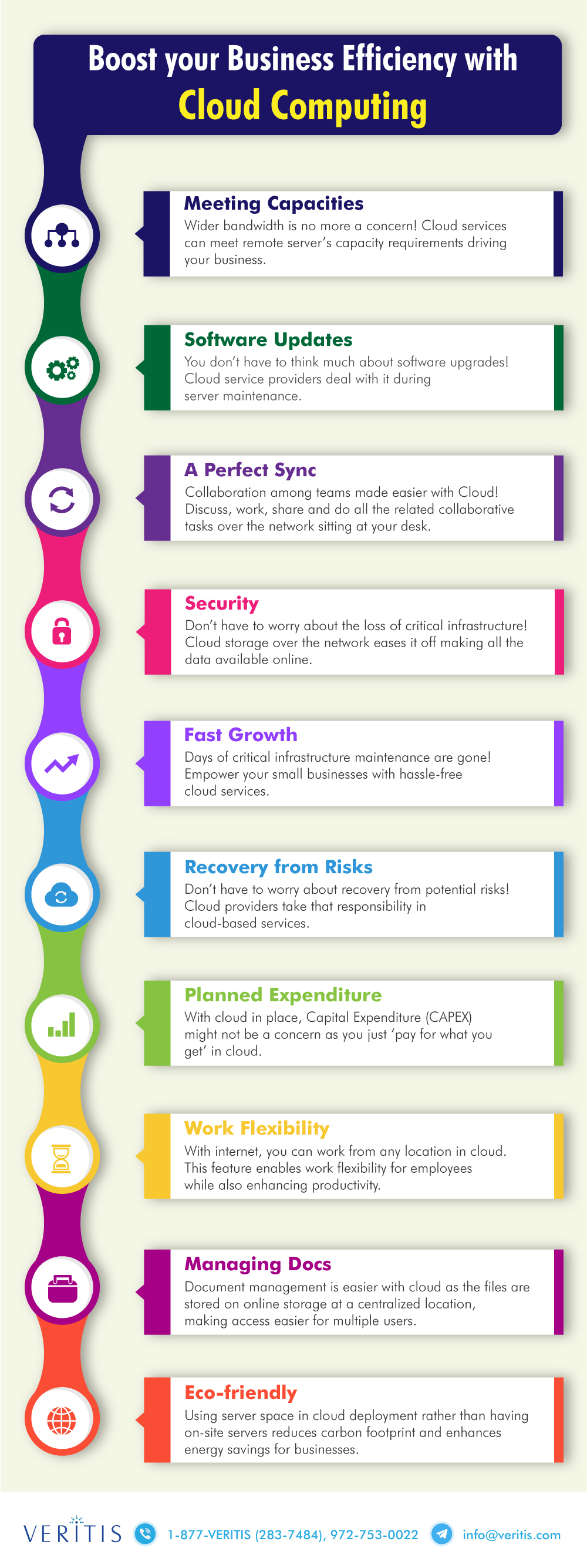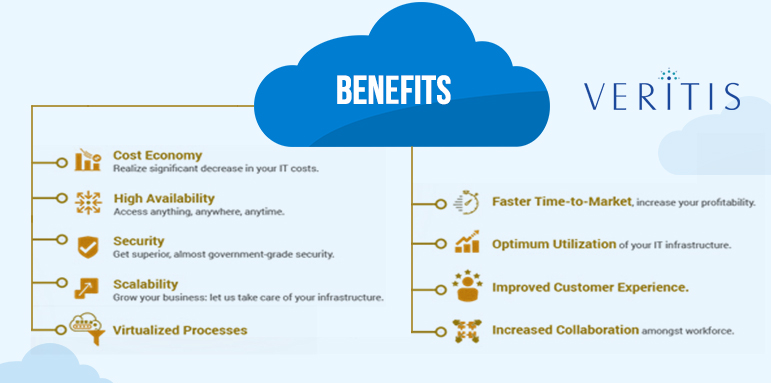
Over the years, technology has influenced almost every industry in maximizing productivity and improving their quality of service.
During the process, it’s the technology-driven IT industry that has benefited a lot from the technology revolution, resulting in skyrocketing growth of many IT firms just because of effective technology deployment.
Beginning with large and complex machines that consumed time and high capital, we have come a long way to witness today’s world of smart technologies driven by continuous innovation.
This run for innovation and technology deployment has facilitated the growth path for firms irrespective of their size. Resultant is what see today that even smaller firms are being able to compete with big players just because of innovation and technology deployment, revenue apart!
One such major technology service that has come as a boon for Small Medium Businesses (SMBs) or Small Medium Enterprises (SMEs) is the ‘Cloud‘.
Let’s take a glance at how Cloud can be beneficial to SMBs or SMEs in offering competitive edge:

- Expand as You Go
Days are gone where you need to spend a lot at the initial stages itself. Now, you can just pay for what you want, and Cloud has made it possible! With the cloud, you can deploy robust software in a step-by-step manner rather than going for it all at once. Doing this gives you the chance to choose the one that suits your requirement at different stages of the product cycle depending on your priorities as and when needed. Besides, this also minimizes your unwanted spending avoiding large capital expenditure. As the cloud involves on-demand services, you can keep updating your existing systems, infrastructure, applications and services with new add-ons as and when required, thus strengthening your infrastructure capabilities in line with the market competition. - Faster Communication
Supported by the fact that cloud runs over the network, engaging cloud services means faster access and quicker delivery. Cloud can facilitate information & communication, quicker community building, reach-out to the customer and management & delivery of application services at a faster rate in a strategic manner. - Easy Resource Acquisition
Cloud-based search has made it easier for firms to gain access to volumes of employee data thus easing talent acquisition process. This comes as a benefit for small firms who would be in continuous quest for right candidates. Besides, cloud-based communication and collaboration tools also facilitate virtual mode of functioning. - Safeguarding Assets
Safeguarding assets is one major challenge for many firms in the current trend. Infrastructure issues or technical glitches often lead to loss of data or data theft. Addressing these concerns, cloud offers efficient storage and backup options that can safeguard data in a safe and secure manner while ensuring productivity and saving costs. - Stay Self-Sustained
Huge and costly software, hardware and server infrastructure is no more a concern. Cloud computing has a solution! Cloud solutions provide you an opportunity to have an individual and self-maintained privately-owned server to store and manage data in house. With the cloud, you can install, manage and update email or file servers, and run backups/storage easily without having to depend on some third-party service provider. All just at your fingertip! However, the responsibility of the service or application maintenance lies with the cloud vendor. - From Anywhere and Anytime
With the cloud functioning over network, one can easily access their business and related applications & data from anywhere at any time at a mobile touch. Many traditional desktop-based application service providers have moved their services to the cloud making the access inexpensive for the small businesses enabling them to compete with the big players. - All in One!
Now, you don’t have to worry about consolidating different application requirements separately. A single multi-cloud computing service can solve it out easily by allowing multiple tasks within a single application.
 Growing Cloud Trend, Especially Among SMBs
Growing Cloud Trend, Especially Among SMBs
There is a growing trend of cloud adoption among small businesses across the world.
Reports indicate a high rise in cloud adoption trend globally majorly driven by the usage of cloud-based services such as cost-effectiveness, increased efficiency, mobility, need for high connectivity and structured and streamlined collaboration.
The trend is more likely to be among SMBs by 2020 owing to their basic requirements to save time and revenues in their path to gaining competitive edge.
Here are some of the interesting facts that indicate a growing cloud adoption trend among small-scale businesses:
A large number of SMBs are currently using at least one cloud-based application as of 2018 and the number is likely to increase in 2018
- According to the reports, Platform-as-a-Service is expected to see a 32 percent rise in adoption by 2020, while Infrastructure-as-a-Service (IaaS) is likely to see a USD 17 billion market by the end of 2018, among other cloud-based services
- An UK-based accountancy and investment management firm in its research found around 76 percent of UK-based SMBs (out of 200 entrepreneurs and firms surveyed) looking out for cloud services adoption to gain business efficiency and competitive edge
- A Microsoft SMB study shows 78 percent of cloud adoption among small-scale businesses by 2020
- An IBM study shows 75 percent of SMBs plan to implement cloud computing projects along with the IT infrastructure improvements
- A report by Frost & Sullivan found more than 400 percent rise in productivity among SMBs as a result of their investment in cloud collaboration tools
- An Amdocs survey also found 80 percent of SMBs willing to keep their communication services on cloud-based solutions
- There is an increasing trend of PaaS and IaaS among SMBs for consumer cloud services, file sharing, CRM, email, chat and internal communication
- While retaining on-premise network, SMBs are more willing to integrate cloud into their network infrastructure as they adopt new technologies
- Hybrid configurations are gaining more traction among SMBs especially in terms of maximizing the existing investments and run effective workloads
- Increasing inclination towards serverless computing for building and running applications so as to ease deployment
- Move towards Edge computing in a move to address cloud challenges in IoT such as real-time response rates or data-transfer costs, and enhance cloud processing capabilities
On an EndNote
Overall, cloud solutions offer advantages to the SMBs in gaining a competitive edge. In a nutshell: cloud solutions for SMBs offer:
|
|
|
|
|
|
|

Cloud services have proven to be one of the most-sought options for small businesses across the globe because of their ease in access and investment-friendly options.
Besides cloud adoption, there is also an increasing trend towards support automation among SMBs so as to lessen the burden on their support teams.
 Analytics is another key aspect that is becoming another key area of focus for SMBs. Now, small firms don’t have thousands of dollars to spend on analytics platforms to get the advantages of predictive analytics. Analytics tools are available for them just at a matter of subscription and insights can be drawn easily on a plug-and-play mode.
Analytics is another key aspect that is becoming another key area of focus for SMBs. Now, small firms don’t have thousands of dollars to spend on analytics platforms to get the advantages of predictive analytics. Analytics tools are available for them just at a matter of subscription and insights can be drawn easily on a plug-and-play mode.
Overall, SMBs have great opportunities ahead in adopting effective strategies to stand atop in competition, and cloud has a vital role in the process.
 Growing Cloud Trend, Especially Among SMBs
Growing Cloud Trend, Especially Among SMBs